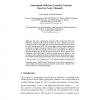21 search results - page 2 / 5 » A Weakness in Some Oblivious Transfer and Zero-Knowledge Pro... |
CRYPTO
2005
Springer
13 years 11 months ago
2005
Springer
Since bit and string oblivious transfer and commitment, two primitives of paramount importance in secure two- and multi-party computation, cannot be realized in an unconditionally ...
IWSEC
2009
Springer
14 years 5 days ago
2009
Springer
Reducing the minimum assumptions needed to construct various cryptographic primitives is an important and interesting task in theoretical cryptography. Oblivious Transfer, one of ...
STOC
1999
ACM
13 years 10 months ago
1999
ACM
Oblivious polynomial evaluation is a protocol involving two parties, a sender whose input is a polynomial P, and a receiver whose input is a value α. At the end of the protocol t...
CORR
2006
Springer
13 years 5 months ago
2006
Springer
Abstract. Oblivious transfer (OT) is a primitive of paramount importance in cryptography or, more precisely, two- and multi-party computation due to its universality. Unfortunately...
MMMACNS
2001
Springer
13 years 10 months ago
2001
Springer
The main cryptographic primitives (Bit Commitment (BC) and Oblivious Transfer (OT) protocols) based on noisy channels have been considered in [1] for asymptotic case. Non-asymptoti...


